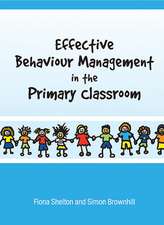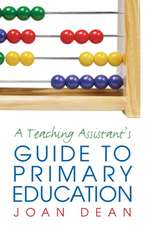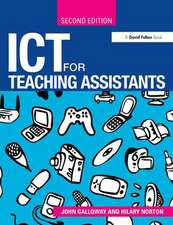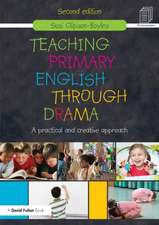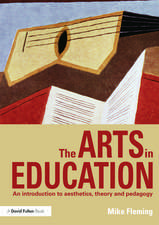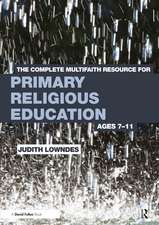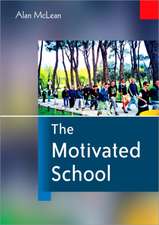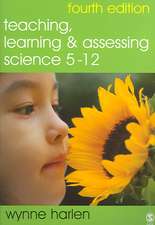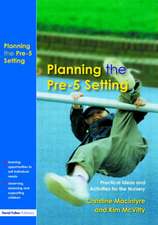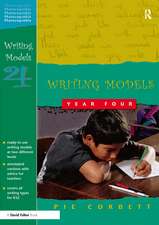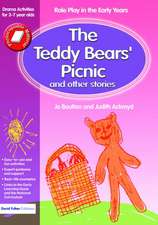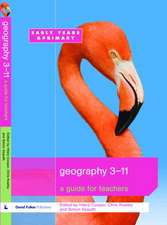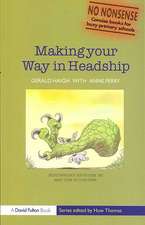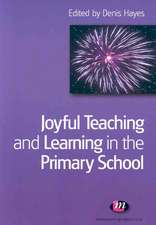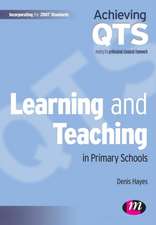Encyclopedia of Primary Education
Autor Denis Hayesen Limba Engleză Paperback – 18 noi 2009
- Curriculum subjects, themes and topics
- Theories, policies and educational controversies
- Pedagogical terms relating to teaching and learning
- Commentaries on current issues in primary education
- Influential figures in education, both past and present
- The impact of educational research on policy and practice
| Toate formatele și edițiile | Preț | Express |
|---|---|---|
| Paperback (1) | 328.23 lei 6-8 săpt. | |
| Taylor & Francis – 18 noi 2009 | 328.23 lei 6-8 săpt. | |
| Hardback (1) | 775.13 lei 6-8 săpt. | |
| Taylor & Francis – 19 noi 2009 | 775.13 lei 6-8 săpt. |
Preț: 328.23 lei
Preț vechi: 368.89 lei
-11% Nou
Puncte Express: 492
Preț estimativ în valută:
62.81€ • 65.57$ • 51.98£
62.81€ • 65.57$ • 51.98£
Carte tipărită la comandă
Livrare economică 04-18 aprilie
Preluare comenzi: 021 569.72.76
Specificații
ISBN-13: 9780415485180
ISBN-10: 0415485185
Pagini: 486
Dimensiuni: 174 x 246 x 27 mm
Greutate: 0.9 kg
Ediția:1
Editura: Taylor & Francis
Colecția David Fulton Publishers
Locul publicării:Oxford, United Kingdom
ISBN-10: 0415485185
Pagini: 486
Dimensiuni: 174 x 246 x 27 mm
Greutate: 0.9 kg
Ediția:1
Editura: Taylor & Francis
Colecția David Fulton Publishers
Locul publicării:Oxford, United Kingdom
Public țintă
Professional and UndergraduateCuprins
LIST OF ENTRIES 1.Ability 2.Ability group 3.Absenteeism 4.Accelerated learning 5.Achievement 6.Act of worship 7.Active learning 8.Admissions code 9.Adult behaviour 10.Affective dimensions of teaching 11.Aims of education 12.Alexander, Robin 13.Alphabet 14.Animals in school 15.Annual meeting 16.Answering questions
17.Assessing pupils’ progress 18.Arithmetic 19.Art and design 20.Arts (The) 21.Assembly 22.Assessing children’s learning 23.Assessment for learning 24.Assessment of learning 25.Assessment types 26.Asthma 27.Attendance 28.Attention-deficit hyperactivity disorder 29.Attention span 30.Auditory learners 31.Autism 32.Awe and wonder 33.Basic skills 34.BECTA 35.Behaviour 36.Beliefs teaching and learning 37.Bereavement 38.Bloom’s Taxonomy 39.Body language
40.Boredom 41.Boys 42.Boys’ education 43.Brain function 44.Break time 45.Breakfast clubs 46.Bruner, Jerome 47.Bullying 48.Busyness 49.Calculators
50.Capital letters 51.Caretakers 52.Caring teachers 53.Centre for literacy in primary education 54.Child advocates 55.Child-centred education 56.Child development theories 57.Child welfare 58.Children 59.Children & young people’s workforce strategy 2020 60.Children’s questions 61.Children and testing 62.Circle-time 63.Citizenship 64.Class control 65.Class management 66.Clegg, Alec 67.Closed questions 68.Coaching 69.Code of Practice 70.Cognitive mapping 71.Collaboration in learning 72.Collaboration (staff) 73.Collaborative problem solving 74.Collective worship 75.Collegiality 76.Communication 77.Community cohesion 78.Community schools 79.Compassion 80.Competition 81.Compliance 82.Comprehension 83.Computer suite 84.Computers in learning 85.Concepts 86.Concluding lessons 87.Constructivism 88.Consumables 89.Context 90.Core subjects 91.Courage (children) 92.Courage (teachers) 93.Creative writing 94.Creativity 95.Cross-curriculum 96.Curiosity 97.Curriculum 98.Curriculum flows 99.Curriculum history
100.Curriculum leadership 101.Curriculum plans 102.Dance 103.Daydreaming
104.Debate 105.Debating 106.Decision-making 107.Deep learning 108.Design & technology 109.Desks 110.Detention 111.Dewey, John 112.Dialogue 113.Dialogue for learning 114.Didactic teaching 115.Differentiation 116.Dilemmas for teachers
117.Disability 118.Discipline 119.Discovery learning 120.Discussion 121.Displays
122.Distractible children 123.Drama 124.Dress code 125.Dyslexia 126.Dyspraxia 127.Early years 128.Early years teachers 129.Educated child 130.Educational visits
131.Effectiveness 132.Einstein, Albert 133.Elementary education 134.Eleven-plus 135.Emotional intelligence 136.Emotional literacy 137.Emotions of learning 138.Emotions of new teachers 139.Emotions of teaching 140.Encouragement and praise
141.English 142.English as an additional language 143.Enjoyment 144.Enquiry
145.Environmental education 146.Environmental studies 147.Environment studies (Scotland) 148.EPPE 3-11 project 149.Equal opportunities 150.Every Child Matters
151.Excellence and enjoyment 152.Excellence in cities 153.Excellent teachers 154.Exercise books 155.Expectations 156.Extended schools 157.External agencies
158.Extra-curricular activities 159.Failure 160.Fairness 161.Faith schools 162.Falling out 163.Family and culture 164.Fantasy 165.Feedback 166.Festivals
167.First & middle schools 168.Forest schools 169.Formative assessment 170.Foundation schools 171.Foundation Stage 172.Foundation Stage assessment 173.Foundation Stage Profile 174.Foundation subjects 175.Free play 176.Friendship benches 177.Friendship 178.Fulfilment in teaching 179.Gender (pupils) 180.Gender (staff) 181.General Teaching Councils 182.General Teaching Council (England) 183.General Teaching Council (Northern Ireland) 184.General Teaching Council (Scotland) 185.General Teaching Council (Wales) 186.Geography 187.Gifted and talented 188.Girls 189.Good teachers 190.Governing body 191.Governors 192.Governor shortage 193.Group work 194.Hadow Reports 195.Handwriting
196.Happiness 197.Head teacher 198.Health and safety 199.Health and safety (adults)
200.Health and safety (computers) 201.Health and safety (physical activity) 202.Health and safety (science) 203.Healthy eating 204.Healthy schools 205.Hearing impairment
206.Higher level teaching assistants 207.History 208.Hobbies and interests 209.Home background and learning 210.Home education 211.Home-school 212.Home-school agreement 213.Home schooling 214.Homework 215.Humanities 216.Humour 217.Imagination 218.Inclusion 219.Individual education plan 220.Induction of pupils
221.Induction of teachers 222.Infants 223.Information technology 224.Initial teaching alphabet 225.Inspections 226.Instruction 227.Integrated day 228.Integrated learning
229.Intelligence 230.Intelligence Quotient 231.Interaction 232.Interactive teaching
233.Interactive whiteboard 234.Intervention 235.Invisible children 236.Isaacs, Susan 237.Janitors 238.Job interviews 239.Job interviews (leadership posts) 240.Job satisfaction 241.Juniors 242.Key stages 243.Kinaesthetic learning 244.Knowledge 245.Large space activities 246.Learned helplessness 247.Learning 248.Learning climate 249.Learning context 250.Learning difficulties (origins) 251.Learning objectives 252.Learning outcomes 253.Learning styles 254.Learning styles and teaching approach 255.Learning support assistants 256.Learning and teacher influence
257.Left-handedness 258.Lesson continuity 259.Lesson management 260.Lesson organisation 261.Lesson pace 262.Lesson planning 263.Lesson planning (joint) 264.Lesson plans 265.Lesson review 266.Lessons 267.Life education 268.Life skills
269.Listening 270.Literacy 271.Literacy hour 272.Literacy Strategy 273.Looked-after children 274.Lower case letters 275.Maintained schools 276.Marshall, Sybil
277.Mathematics 278.Mathematics Primary Framework 279.Mealtime assistants 280.Medication 281.Memory and memorising 82.Meta-learning 283.Metacognition
284.Middle schools 285.Minority ethnic children 286.Minority ethnic group under-achievement 287.Misbehaviour 288.Mistakes and misconceptions 289.Mixed ability teaching 290.Modelling behaviour 291.Modern foreign languages 292.Monitoring
293.Moral choices 294.Moral development 295.Morality 296.Motivation for learning
297.Motivation for teaching 298.Motor skills 299.Multiple intelligences 300.Multiplication tables 301.Music 302.National Curriculum 303.National Governors Association 304.National Primary Strategy 305.Nature-nurture 306.Nature study 307.Naughtiness 308.New entrants 309.Non-core subjects 310.Nonverbal communication 311.Numeracy 312.Numeracy hour 313.Numeracy Strategy 314.Nursery schools 315.Nurturing children 316.Nurturing adults 317.Observing children 318.Office for Standards in Education 319.Office for Standards in Education, Children’s Services & Skills 320.Open evening 321.Open questions 322.Oracy
323.Organising for learning 324.Out of class 325.Outdoor education 326.P-scales
327.Paired work 328.Parent communication 329.Parental involvement
330.Parents supporting learning 331.Parents’ evening 332.Passion in teaching
333.Pedagogical framing 334.Pedagogy 335.Peer coaching and review
336.Peer mediation 337.Peer mentoring 338.Personal education plan
339.Personal intelligence 340.Personal social & health education (SEAL) 341.Personalised curriculum 342.Personalised learning 343.Philosophy for children 344.Phonics 345.Physical comfort 346.Physical Education 347.Piaget, Jean
348.Planning 349.Play 350.Play (older pupils) 351.Playfulness 352.Playground 353.Playtime 354.Plenary 355.Plowden Report 356.Poetry 357.Political involvement 358.PPA time 359.Praise 360.Primary National Strategy 361.Primary reviews 362.Primary school 363.Private education 364.Probationary year 365.Problem solving 366.Professional development 367.Professionalism 368.Progression in learning 369.Project work 370.Punishment 371.Pupil numbers 372.Pupil personality and attainment 373.Pupil perspectives 374.Pupil questions 375.Qualification & Curriculum Authority 376.Questions and questioning 377.Reading 378.Reading aloud
379.Reading debate 380.Reading records 381.Reading recovery 382.Reading schemes
383.Real books 384.Reception 385.Recess 386.Recording 387.Reflection 388.Reggio Emilia 389.Relationships 390.Religious education 391.Reporting 392.Reputation (teachers) 393.Restorative justice 394.Retention in learning 395.Rewards 396.Rising fives 397.Rose Curriculum Review 2009 398.Rote learning 399.Rules 400.Sanctions 401.SATs 402.Schemes of work 403.Schiller, Christian 404.School attendance 405.School climate 406.School councils 407.School library 408.School life 409.School secretary 410.Schoolyard 411.Science 412.Scottish Curriculum 413.Scottish Curriculum Framework 3-5 414.Seating arrangements 415.Security
416.Self-esteem (children) 417.Self-esteem (teachers) 418.SENCO 419.Setting and streaming 420.Sex education 421.Shared reading 422.Shared writing 423.Singing
424.Skills 425.Slow learners 426.Social constructivism 427.Social development
428.Social and emotional aspects of learning 429.Social learning 430.Spatial-temporal reasoning 431.Speaking and listening 432.Special educational needs 433.Special events 434.Special school 435.Speculative questions 436.Speech 437.Speech clarity
438.Speed of work 439.Spelling 440.Spiral curriculum 441.Spiritual education 442.Sport 443.Sports days 444.Staffroom 445.Starting school 446.Statementing 447.Steiner Waldorf 448.Stepping stones 449.Stereotyping 450.Stories 451.Subject leadership 452.Success 453.Suitability for teaching 454.Summative assessment
455.Superficial learning 456.Sure Start 457.Suspension and exclusion 458.Synthetic phonics 459.Tactile learners 460.Talk 461.Target setting (adults) 462.Target setting (children) 463.Taylor Report 464.Teacher behaviour 465.Teacher Learning Academy
466.Teacher-pupil interaction 467.Teacher retention 468.Teacher role 469.Teachers’ beliefs 470.Teaching approach 471.Teaching assistants 472.Teaching methods 473.Teaching profession 474.Teaching skills 475.Teaching stance 476.Teaching strategy 477.Teamwork 478.Television 479.Tests and testing 480.Textbooks 481.Thematic learning 482.Think-pair-share 483.Thinking 484.Thinking skills
485.Three Wise Men 486.Time allocation in lessons 487.Time management
488.Time on task 489.Time-out 490.Topic work 491.Trainee teachers 492.Transitions 493.Trust 494.Understanding 495.Uniform 496.United Kingdom Literacy Association 497.Value added 498.Values 499.Visual aids 500.Visual auditory and kinaesthetic learning 501.Visual learners 502.Voice care 503.Voluntary Aided schools 504.Voluntary Controlled schools 505.Warnock Report 506.Welcoming environment 507.Wet playtime 508.Whitehead, Chris
509.William Tyndale controversy 510.Workforce reforms 511.Wragg, Ted 512.Writing 513.Writing frames 514.Year class system 515.Zone of Proximal Development
17.Assessing pupils’ progress 18.Arithmetic 19.Art and design 20.Arts (The) 21.Assembly 22.Assessing children’s learning 23.Assessment for learning 24.Assessment of learning 25.Assessment types 26.Asthma 27.Attendance 28.Attention-deficit hyperactivity disorder 29.Attention span 30.Auditory learners 31.Autism 32.Awe and wonder 33.Basic skills 34.BECTA 35.Behaviour 36.Beliefs teaching and learning 37.Bereavement 38.Bloom’s Taxonomy 39.Body language
40.Boredom 41.Boys 42.Boys’ education 43.Brain function 44.Break time 45.Breakfast clubs 46.Bruner, Jerome 47.Bullying 48.Busyness 49.Calculators
50.Capital letters 51.Caretakers 52.Caring teachers 53.Centre for literacy in primary education 54.Child advocates 55.Child-centred education 56.Child development theories 57.Child welfare 58.Children 59.Children & young people’s workforce strategy 2020 60.Children’s questions 61.Children and testing 62.Circle-time 63.Citizenship 64.Class control 65.Class management 66.Clegg, Alec 67.Closed questions 68.Coaching 69.Code of Practice 70.Cognitive mapping 71.Collaboration in learning 72.Collaboration (staff) 73.Collaborative problem solving 74.Collective worship 75.Collegiality 76.Communication 77.Community cohesion 78.Community schools 79.Compassion 80.Competition 81.Compliance 82.Comprehension 83.Computer suite 84.Computers in learning 85.Concepts 86.Concluding lessons 87.Constructivism 88.Consumables 89.Context 90.Core subjects 91.Courage (children) 92.Courage (teachers) 93.Creative writing 94.Creativity 95.Cross-curriculum 96.Curiosity 97.Curriculum 98.Curriculum flows 99.Curriculum history
100.Curriculum leadership 101.Curriculum plans 102.Dance 103.Daydreaming
104.Debate 105.Debating 106.Decision-making 107.Deep learning 108.Design & technology 109.Desks 110.Detention 111.Dewey, John 112.Dialogue 113.Dialogue for learning 114.Didactic teaching 115.Differentiation 116.Dilemmas for teachers
117.Disability 118.Discipline 119.Discovery learning 120.Discussion 121.Displays
122.Distractible children 123.Drama 124.Dress code 125.Dyslexia 126.Dyspraxia 127.Early years 128.Early years teachers 129.Educated child 130.Educational visits
131.Effectiveness 132.Einstein, Albert 133.Elementary education 134.Eleven-plus 135.Emotional intelligence 136.Emotional literacy 137.Emotions of learning 138.Emotions of new teachers 139.Emotions of teaching 140.Encouragement and praise
141.English 142.English as an additional language 143.Enjoyment 144.Enquiry
145.Environmental education 146.Environmental studies 147.Environment studies (Scotland) 148.EPPE 3-11 project 149.Equal opportunities 150.Every Child Matters
151.Excellence and enjoyment 152.Excellence in cities 153.Excellent teachers 154.Exercise books 155.Expectations 156.Extended schools 157.External agencies
158.Extra-curricular activities 159.Failure 160.Fairness 161.Faith schools 162.Falling out 163.Family and culture 164.Fantasy 165.Feedback 166.Festivals
167.First & middle schools 168.Forest schools 169.Formative assessment 170.Foundation schools 171.Foundation Stage 172.Foundation Stage assessment 173.Foundation Stage Profile 174.Foundation subjects 175.Free play 176.Friendship benches 177.Friendship 178.Fulfilment in teaching 179.Gender (pupils) 180.Gender (staff) 181.General Teaching Councils 182.General Teaching Council (England) 183.General Teaching Council (Northern Ireland) 184.General Teaching Council (Scotland) 185.General Teaching Council (Wales) 186.Geography 187.Gifted and talented 188.Girls 189.Good teachers 190.Governing body 191.Governors 192.Governor shortage 193.Group work 194.Hadow Reports 195.Handwriting
196.Happiness 197.Head teacher 198.Health and safety 199.Health and safety (adults)
200.Health and safety (computers) 201.Health and safety (physical activity) 202.Health and safety (science) 203.Healthy eating 204.Healthy schools 205.Hearing impairment
206.Higher level teaching assistants 207.History 208.Hobbies and interests 209.Home background and learning 210.Home education 211.Home-school 212.Home-school agreement 213.Home schooling 214.Homework 215.Humanities 216.Humour 217.Imagination 218.Inclusion 219.Individual education plan 220.Induction of pupils
221.Induction of teachers 222.Infants 223.Information technology 224.Initial teaching alphabet 225.Inspections 226.Instruction 227.Integrated day 228.Integrated learning
229.Intelligence 230.Intelligence Quotient 231.Interaction 232.Interactive teaching
233.Interactive whiteboard 234.Intervention 235.Invisible children 236.Isaacs, Susan 237.Janitors 238.Job interviews 239.Job interviews (leadership posts) 240.Job satisfaction 241.Juniors 242.Key stages 243.Kinaesthetic learning 244.Knowledge 245.Large space activities 246.Learned helplessness 247.Learning 248.Learning climate 249.Learning context 250.Learning difficulties (origins) 251.Learning objectives 252.Learning outcomes 253.Learning styles 254.Learning styles and teaching approach 255.Learning support assistants 256.Learning and teacher influence
257.Left-handedness 258.Lesson continuity 259.Lesson management 260.Lesson organisation 261.Lesson pace 262.Lesson planning 263.Lesson planning (joint) 264.Lesson plans 265.Lesson review 266.Lessons 267.Life education 268.Life skills
269.Listening 270.Literacy 271.Literacy hour 272.Literacy Strategy 273.Looked-after children 274.Lower case letters 275.Maintained schools 276.Marshall, Sybil
277.Mathematics 278.Mathematics Primary Framework 279.Mealtime assistants 280.Medication 281.Memory and memorising 82.Meta-learning 283.Metacognition
284.Middle schools 285.Minority ethnic children 286.Minority ethnic group under-achievement 287.Misbehaviour 288.Mistakes and misconceptions 289.Mixed ability teaching 290.Modelling behaviour 291.Modern foreign languages 292.Monitoring
293.Moral choices 294.Moral development 295.Morality 296.Motivation for learning
297.Motivation for teaching 298.Motor skills 299.Multiple intelligences 300.Multiplication tables 301.Music 302.National Curriculum 303.National Governors Association 304.National Primary Strategy 305.Nature-nurture 306.Nature study 307.Naughtiness 308.New entrants 309.Non-core subjects 310.Nonverbal communication 311.Numeracy 312.Numeracy hour 313.Numeracy Strategy 314.Nursery schools 315.Nurturing children 316.Nurturing adults 317.Observing children 318.Office for Standards in Education 319.Office for Standards in Education, Children’s Services & Skills 320.Open evening 321.Open questions 322.Oracy
323.Organising for learning 324.Out of class 325.Outdoor education 326.P-scales
327.Paired work 328.Parent communication 329.Parental involvement
330.Parents supporting learning 331.Parents’ evening 332.Passion in teaching
333.Pedagogical framing 334.Pedagogy 335.Peer coaching and review
336.Peer mediation 337.Peer mentoring 338.Personal education plan
339.Personal intelligence 340.Personal social & health education (SEAL) 341.Personalised curriculum 342.Personalised learning 343.Philosophy for children 344.Phonics 345.Physical comfort 346.Physical Education 347.Piaget, Jean
348.Planning 349.Play 350.Play (older pupils) 351.Playfulness 352.Playground 353.Playtime 354.Plenary 355.Plowden Report 356.Poetry 357.Political involvement 358.PPA time 359.Praise 360.Primary National Strategy 361.Primary reviews 362.Primary school 363.Private education 364.Probationary year 365.Problem solving 366.Professional development 367.Professionalism 368.Progression in learning 369.Project work 370.Punishment 371.Pupil numbers 372.Pupil personality and attainment 373.Pupil perspectives 374.Pupil questions 375.Qualification & Curriculum Authority 376.Questions and questioning 377.Reading 378.Reading aloud
379.Reading debate 380.Reading records 381.Reading recovery 382.Reading schemes
383.Real books 384.Reception 385.Recess 386.Recording 387.Reflection 388.Reggio Emilia 389.Relationships 390.Religious education 391.Reporting 392.Reputation (teachers) 393.Restorative justice 394.Retention in learning 395.Rewards 396.Rising fives 397.Rose Curriculum Review 2009 398.Rote learning 399.Rules 400.Sanctions 401.SATs 402.Schemes of work 403.Schiller, Christian 404.School attendance 405.School climate 406.School councils 407.School library 408.School life 409.School secretary 410.Schoolyard 411.Science 412.Scottish Curriculum 413.Scottish Curriculum Framework 3-5 414.Seating arrangements 415.Security
416.Self-esteem (children) 417.Self-esteem (teachers) 418.SENCO 419.Setting and streaming 420.Sex education 421.Shared reading 422.Shared writing 423.Singing
424.Skills 425.Slow learners 426.Social constructivism 427.Social development
428.Social and emotional aspects of learning 429.Social learning 430.Spatial-temporal reasoning 431.Speaking and listening 432.Special educational needs 433.Special events 434.Special school 435.Speculative questions 436.Speech 437.Speech clarity
438.Speed of work 439.Spelling 440.Spiral curriculum 441.Spiritual education 442.Sport 443.Sports days 444.Staffroom 445.Starting school 446.Statementing 447.Steiner Waldorf 448.Stepping stones 449.Stereotyping 450.Stories 451.Subject leadership 452.Success 453.Suitability for teaching 454.Summative assessment
455.Superficial learning 456.Sure Start 457.Suspension and exclusion 458.Synthetic phonics 459.Tactile learners 460.Talk 461.Target setting (adults) 462.Target setting (children) 463.Taylor Report 464.Teacher behaviour 465.Teacher Learning Academy
466.Teacher-pupil interaction 467.Teacher retention 468.Teacher role 469.Teachers’ beliefs 470.Teaching approach 471.Teaching assistants 472.Teaching methods 473.Teaching profession 474.Teaching skills 475.Teaching stance 476.Teaching strategy 477.Teamwork 478.Television 479.Tests and testing 480.Textbooks 481.Thematic learning 482.Think-pair-share 483.Thinking 484.Thinking skills
485.Three Wise Men 486.Time allocation in lessons 487.Time management
488.Time on task 489.Time-out 490.Topic work 491.Trainee teachers 492.Transitions 493.Trust 494.Understanding 495.Uniform 496.United Kingdom Literacy Association 497.Value added 498.Values 499.Visual aids 500.Visual auditory and kinaesthetic learning 501.Visual learners 502.Voice care 503.Voluntary Aided schools 504.Voluntary Controlled schools 505.Warnock Report 506.Welcoming environment 507.Wet playtime 508.Whitehead, Chris
509.William Tyndale controversy 510.Workforce reforms 511.Wragg, Ted 512.Writing 513.Writing frames 514.Year class system 515.Zone of Proximal Development
Notă biografică
Denis Hayes was Professor of Primary Education at the University of Plymouth. He has extensive experiences as a primary teacher, deputy head, head teacher, teacher trainer, academic and researcher.
Recenzii
'Those of us particularly concerned with the English Curriculum will find the entries on 'creative writing', 'stories' and 'phonics' of interest. The attention to affective aspects of children's development - to feelings and relationships - also appeals and is particularly evident in entries on 'awe and wonder', 'curiosity' and 'trust.' - English 4-11 Summer 2010
Descriere
Unique in its field the Encyclopedia of Primary Education brings together a wide ranging body of information relating to current educational practice in a single indispensable volume.

